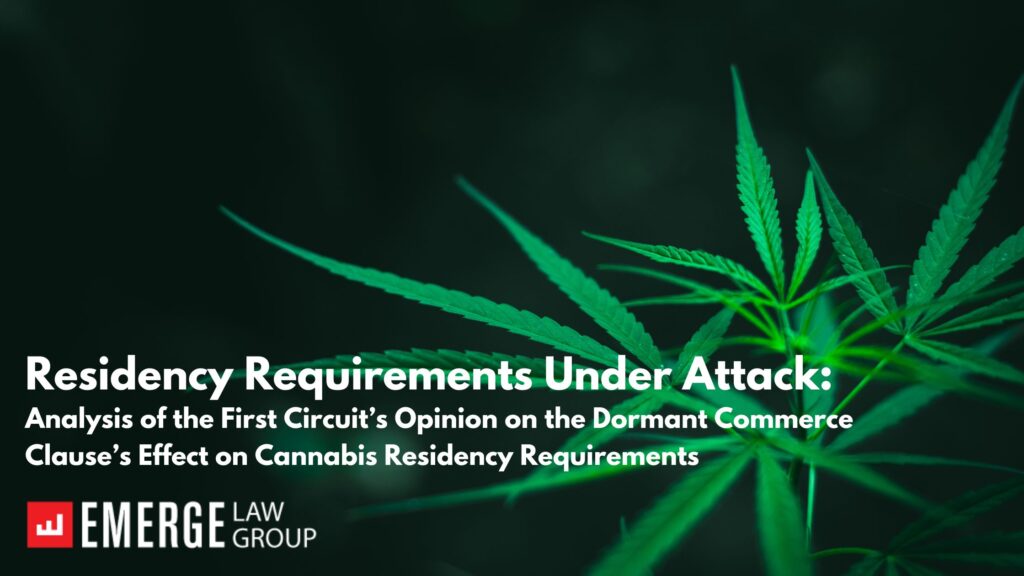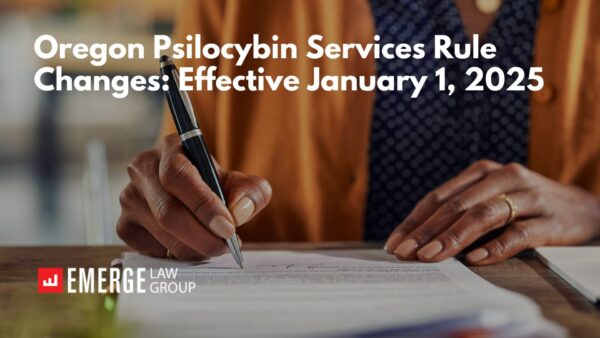Author:
Blake Marvis, Attorney at Emerge Law Group; Oregon Litigation Practice Group
In August, the First Circuit Court of Appeals became the first federal appeals court to address an issue that had been litigated in district courts since 2020. The question was relatively straightforward – does the dormant commerce clause (“DCC”) prohibit state residency requirements for owners of state-licensed cannabis businesses?
Many states that have legalized cannabis instituted various types of residency requirements for owning or operating a cannabis business within their borders. The Supreme Court’s decision in Tennessee Wine and Spirits Retailers Association v. Thomas, 139 S.Ct. 2449 (2019) also breathed some new life into the DCC. Multiple cannabis-related cases leveraged that decision to make stronger DCC arguments.
Numerous district court cases that addressed this issue concluded that various residency requirements violated the DCC. See NPG, LLC v. City of Portland, Maine, 2020 WL 474913, at *10-11 (D. Maine, Aug. 14, 2020) (determining that the DCC “likely restricts the City’s licensing of marijuana retail stores”); Toigo v. Dep’t of Health and Senior Servs., 549 F. Supp. 3d 985, 995-996 (W.D. Miss. 2021) (granting preliminary injunction and determining that Missouri’s “residency requirement is likely unconstitutional under the dormant commerce clause.”); Lowe v. City of Detroit, 544 F. Supp. 3d 804, 815-816 (E.D. Mich. 2021) (granting preliminary injunction against residency requirement based on violation of the DCC). However, one district court determined that because cannabis is illegal under federal law, the DCC offered no protection or mechanism for striking down residency requirements related to cannabis. See Original Investments, LLC v. State, 542 F. Supp. 3d 1230, 1234-1237 (W.D. Ok. 2021).
The First Circuit sided with the majority of district court decisions and held that Maine’s residency requirement for officers and directors of medical cannabis dispensaries violated the DCC. See Northeast Patients Group v. United Cannabis Patients and Caregivers of Maine, 45 F.4th 542, 558 (1st Cir. 2022). The First Circuit addressed defendant’s three main arguments in making its holding.
First, the Court addressed the argument that because cannabis is illegal under federal law, there is no “interstate” market for cannabis. Therefore, the DCC does not apply because Maine was not discriminating against any “interstate” market. Id. at 547. The Court rejected this argument, stating that Gonzales v. Raich had established there was an interstate market for cannabis that Congress could regulate, even though that market was illegal. Id. The Court also looked to the fact that Congress had passed the Rohrabacher-Farr Amendment, and identical versions every annual congressional appropriation since, which the Court considered a tacit acknowledgement of the interstate cannabis market. Id. at 547-48.
Second, the Court addressed the argument that because cannabis is federally illegal under the Controlled Substances Act (“CSA”), the DCC offered no protection to such illegal commerce. Id. at 548. The Court rejected this argument as well, indicating that the precise question before it was not “whether the CSA preempts the residency requirement,” but rather whether “the residency requirement cannot stand because it transgresses the [DCC] due to the substantial burden that this requirement . . . imposes on interstate commerce.” Id. The Court also focused again on how Congress had passed legislation related to state-legal cannabis regimes – including the Rohrabacher-Farr Amendment – since the enactment of the CSA, which reflects that “Congress contemplates both that an interstate market in medical marijuana may exist that is free from federal criminal enforcement and that, if so, this interstate market may be subject to state regulation.” Id. at 549-550.
Third, the Court addressed the final argument from defendants, which asserted that the CSA evidenced Congress’s intent to “consent to otherwise impermissible state regulation.” Id. at 550. After extensive discussion about which legal standard to apply (i.e., whether Congress needed to make a “clear statement” or not on the issue), the Court ultimately determined that Congress did not need to make a clear statement that residency requirements were permissible, CSA notwithstanding. Id. at 553.
Zooming out, the real thrust of the First Circuit’s decision narrowed in on how the situation of state-legal cannabis is unique. The Court avoided a finding that the DCC did not apply without a clearer statement from Congress on the issue. In other words, the Congressional intent that could be gathered from the CSA, the Rohrabacher-Farr Amendment, and other cannabis related legislation was mixed and the Court would not interpret this mixed intent as barring application of the DCC.
It is important to note that the First Circuit’s decision was not unanimous and Judge Gelpi dissented from the holding. Id. at 558. The dissent focused on the argument that the CSA rendered cannabis illegal, which subsequently bars application of the DCC. Id. at 558-559. In other words, the dissent determined that the “fundamental objective” of the DCC was “inapplicable, because Congress has already outlawed the national market for marijuana.” Id. at 559. Interestingly, the dissent agreed that the DCC would render the residency requirement unconstitutional, but that the appellees “should not be able to receive a constitutional remedy in federal court to protect the sale and distribution of a controlled substance which remains illegal under federal law.” Id. at 560.
Overall, the First Circuit decision provides an interesting glimpse into how subsequent cases addressing this issue could be litigated. It seems most likely that other federal courts will follow suit and continue to find that the DCC prohibits various residency requirements implemented by states with legal cannabis industries. Although, the dissent does provide some potential for contrary arguments. Similar DCC and constitutional issues will be raised in the recent Oregon lawsuit seeking to overturn the prohibition on interstate cannabis sales. And this type of reasoning can also be applied to other controlled substances, including the up-and-coming psychedelics industry in Oregon and in other states.





